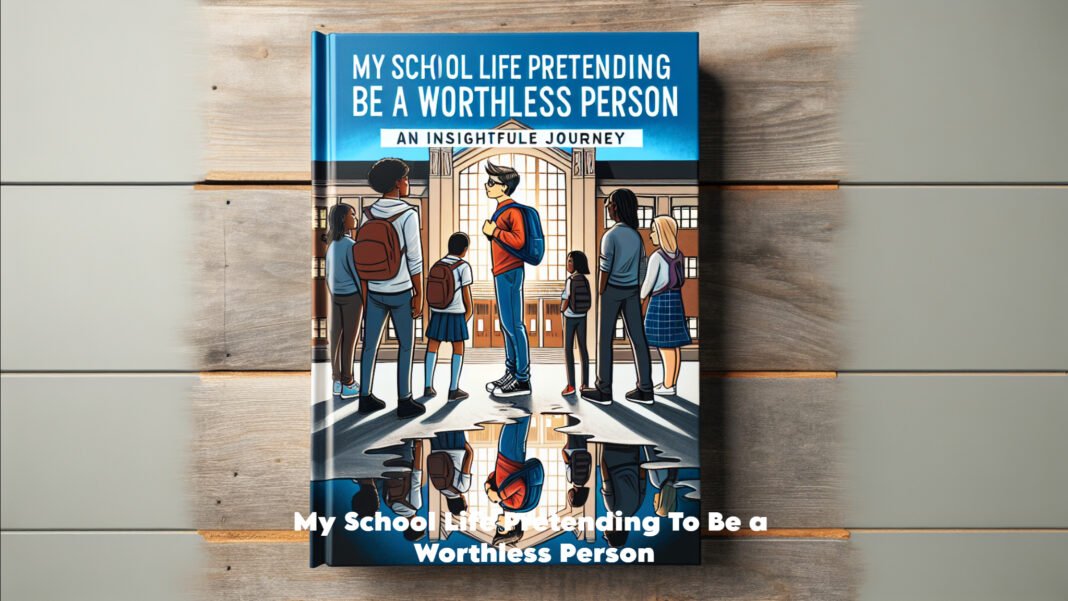In the manhwa series “My School Life Pretending To Be a Worthless Person,” serialized by author Jung Ji-Hoon at the end of 2022 on Naver and later hosted on LINE Webtoons, readers are invited into a narrative that defies conventional academic expectations. The protagonist chooses a path less traveled in school, deliberately underperforming to sidestep the pressures and expectations associated with academic excellence. This decision, while controversial, opens up a world of personal exploration in arts, music, and sports, revealing that worth cannot solely be measured by grades.
Embracing this unique journey, the individual forms meaningful connections with classmates, not as a competitor but as a relatable companion, challenging the traditional narrative of success. Despite facing criticism from teachers, family, and college admissions officers, the protagonist discovers joy and fulfillment in this unconventional route, underscoring the importance of personal fulfillment over societal approval. This story offers an insightful look into the complexities of school life, societal expectations, and the courage to choose one’s own path.
Breakdown of “My School Life Pretending To Be a Worthless Person”
In the heart of the narrative, Park Jinsung’s life at school is a testament to the harsh realities of a society that values individuals based on their Idea rating—a measure reflecting their combat abilities. Jinsung, with an F-rank soul and combat power, faces daily challenges:
- Bullying and Isolation: Due to his low rank, Jinsung is often bullied and seen as a burden by his peers, showcasing the societal pressure to conform to arbitrary standards of worth.
- Hidden Potential: Unbeknownst to many, Jinsung possesses the S-rank “Absolute Killing Intent,” a stark contrast to his perceived weakness. This duality adds complexity to his character and the narrative.
- Struggle for Acceptance: Jinsung’s journey is not just about controlling his killing intent but also about challenging the notion that one’s soul can be ranked. This struggle against societal norms and self-acceptance forms the crux of the story.
The school setting, serving as a microcosm of society, significantly influences the characters and storylines, highlighting themes of talent, adversity, and the human spirit. Through Jinsung’s eyes, readers explore the intricate dynamics of a military school system obsessed with Edeya—a mysterious force resistant to conventional weapons—and its impact on students’ lives.
The Catalyst for Pretense
In navigating the complexities of pretending to be a lesser version of oneself, several underlying motivations emerge. Individuals might downplay their capabilities or feign the need for assistance due to a myriad of reasons, including:
- Ease and Convenience: Seeking to simplify tasks, save time, or avoid exertion.
- Social Manipulation: Aiming to appear busier or more engaged than they are, or taking advantage of others’ goodwill.
Conversely, the reluctance to seek genuine help when needed often stems from deep-seated fears and societal pressures, such as:
- Fear of Judgment: Concern over being perceived negatively or not fitting in.
- Mental Health Stigma: Anxiety about the implications of admitting to struggles, including the fear of hospitalization.
- Isolation: Preferring to bottle up emotions rather than confide in others, often due to perceived lack of access to appropriate support.
These behaviors are further complicated by phenomena like impostor syndrome, where individuals doubt their achievements and fear being exposed as frauds. This syndrome manifests in various forms, including the perfectionist, the expert, and the superperson, each associated with unique challenges and coping strategies, such as:
- Perfectionist: Striving for flawlessness and setting excessively high goals.
- Expert: Feeling the need to know every piece of information before starting a project.
- Superperson: Pushing oneself to work harder than others to prove worth.
Addressing these issues requires acknowledging their root causes, such as low self-esteem or unresolved trauma, and implementing coping mechanisms like seeking community support, reassessing one’s abilities, and moderating social media use.
Societal Pressure and Peer Dynamics
In exploring the dynamics of societal pressure and peer influence, it’s essential to recognize the multifaceted ways in which they manifest and impact individuals, especially in a school setting. Social pressure can emerge through:
- Explicit Demands: Direct requests or commands from peers to behave in a certain way.
- Implicit Expectations: Unspoken norms and standards that group members are expected to follow.
- Subtle Influences: Indirect pressures, such as the desire to be accepted or to conform to what is perceived as popular.
The desire to fit in is a powerful motivator for conforming to these pressures, potentially rooted in evolutionary psychology. However, the outcome of this conformity can vary greatly. On one hand, it can foster a sense of belonging and community, leading to positive social interactions. On the other, it can encourage harmful behaviors or suppress individuality.
Understanding the balance between yielding to social pressure and asserting one’s independence is crucial. Strategies to navigate this balance include:
- Recognizing the value of expressing one’s individuality, which can enhance self-esteem and strengthen personal identity.
- Developing the skill to make independent decisions, a vital competency for personal growth and self-discovery.
- Seeking support, such as online therapy, to address and manage the challenges associated with social pressure.
Moreover, the impact of peer pressure extends beyond immediate social circles, with media playing a significant role in shaping perceptions and behaviors. This influence is particularly pronounced in the context of body image concerns, where peer feedback and media portrayals interact with individual predispositions to affect self-perception. Recognizing the signs of peer pressure and fostering environments that encourage open communication and assertiveness can help mitigate its negative impacts.
The Dual Life
Living a dual life often creates a significant gap between one’s external persona and internal reality. This discrepancy can lead to a myriad of consequences for both the individual and those around them. Here are some key insights into the complexities and repercussions of leading such a life:
- Psychological Impact:
- Vulnerability and Authenticity: Failing to acknowledge one’s flaws can prevent individuals from experiencing the full extent of grace and love, particularly in a Christian context where these elements are crucial.
- Consequences of Secrecy: The thrill of leading a secret life may seem enticing, but it can lead to exhaustion and mental health issues due to the constant effort required to maintain the facade.
- Impact on Relationships: Deception in personal relationships, such as infidelity, not only causes heartache for the parties involved but can also lead to severe trust issues and emotional distress.
- Societal and Personal Repercussions:
- Loss of Reputation and Trust: Exposure of a dual life can result in severe damage to one’s reputation, loss of trust among family and friends, and in some cases, legal consequences.
- Influence of Online Behavior: The internet facilitates easier concealment of dual lives, lowering the threshold for guilt and increasing the risk of engaging in deceitful activities like catfishing.
Understanding the allure and dangers of leading a dual life is essential. It involves complex psychological needs, such as escapism and the thrill of deception, which can have profound effects on an individual’s life and those around them.
Challenges and Revelations
The journey through My School Life Pretending to Be a Worthless Person unveils a series of challenges and revelations that resonate deeply with readers, fostering a connection that transcends the pages. Key moments include:
- Unexpected Plot Developments: The narrative thrives on twists and turns, keeping readers on the edge of their seats. This unpredictability mirrors the unpredictability of life, emphasizing that the path to self-discovery and personal growth is often non-linear and filled with surprises.
- Personal Growth through Challenges:
- Overcoming obstacles is crucial for character development.
- Learning from mistakes enriches the journey, making victories more rewarding.
- Revelations and Listening:
- The challenge of revelation emphasizes the importance of listening and obedience, drawing parallels with biblical teachings where obedience is valued over sacrifice.
- The struggle to hear and understand, despite being attentive, highlights the complexities of communication with the divine, urging a deeper introspection and reliance on faith.
This exploration of challenges and revelations not only enriches the narrative but also offers profound insights into the human condition, encouraging readers to reflect on their own lives and the lessons learned along the way.
Self-Discovery Through Adversity
Adversity often serves as a crucible for self-discovery and personal development, revealing strengths and weaknesses while highlighting areas for growth. The journey through adversity is not linear but filled with valuable lessons:
- Learning from Mistakes: Embracing failures as learning opportunities enables individuals to refine their strategies and approaches, leading to more effective problem-solving in the future.
- Celebrating Successes: Recognizing and celebrating small victories boosts morale and reinforces the belief in one’s ability to overcome challenges.
- Clarifying Values and Goals: Adversity prompts reflection on what truly matters, helping to realign actions with core values and long-term objectives.
Personal growth is further facilitated by developing resilience and a strong sense of self, which are essential in navigating the pressures of society. This process involves:
- Building Resilience: Cultivating a positive self-image and the ability to bounce back from setbacks.
- Embracing Individualism: Valuing one’s unique qualities and resisting the urge to conform to unrealistic societal standards.
Moreover, adversity encourages the adoption of healthy habits and a positive mindset, which are pivotal for achieving success, happiness, and fulfillment. These include:
- Adopting Healthy Habits: Regular physical activity, quality sleep, and a balanced diet contribute to physical and mental well-being.
- Maintaining a Positive Mindset: Journaling, practicing gratitude, and setting realistic goals help maintain focus and a positive outlook on life.
Through these practices, individuals can navigate the challenges posed by adversity, leading to profound personal growth and the discovery of deeper meaning and purpose in life.
Reflecting on the Journey
Reflecting on the journey of My School Life Pretending to Be a Worthless Person reveals the profound impact of reflection in understanding life’s value and navigating personal growth. This process is not a mere introspection but a critical evaluation of one’s actions and their outcomes, necessitating an honest and open approach. Here are the key aspects of effective reflection:
- Critical Evaluation:
- Acknowledge strengths and areas for improvement.
- Take responsibility for actions and their outcomes, avoiding the trap of attributing them solely to external factors.
- Learning from Experiences:
- Use past experiences as a learning tool for future situations.
- Apply knowledge gained to similar scenarios, enhancing decision-making and personal development.
- Developing Essential Skills:
- Reflection fosters empathy, communication, adaptability, and emotional intelligence.
- It is foundational in cultivating compassion and soft skills crucial for personal and professional growth.
Practicing reflection through journaling, meditation, or coaching can be time-consuming and emotionally taxing but is vital for personal development. Being consistent, curious, and specific in reflection practices enables individuals to gain insights into their behavior and its consequences, paving the way for meaningful change and growth.
Conclusion
As we delve into the intricacies of “My School Life Pretending to Be a Worthless Person,” we uncover a rich tapestry of life’s challenges and triumphs, all orchestrated around the central theme of self-discovery through adversity. The protagonist’s unconventional journey not only challenges societal norms and expectations but also serves as a powerful testament to the importance of personal fulfillment and the true measure of one’s worth. This narrative gracefully highlights the omnipresent pressure to conform, the genuine struggle for acceptance, and the indomitable human spirit in the face of adversity, providing readers with profound insights into the complexity of human life and relationships.
Reflecting on this journey underscores the crucial role of introspection, resilience, and the embrace of one’s individuality in navigating the pressures of society. It beckons readers to consider their own paths, urging a contemplation of how adversity can be a catalyst for growth and a deeper understanding of oneself. The story of Park Jinsung invites us to reflect on our own challenges and revelations, pushing us toward a greater appreciation of life’s nuanced lessons and the endless possibilities that come with choosing authenticity over conformity. Thus, the narrative leaves us with a lingering sense of empowerment and the courage to forge our own paths, undeterred by societal expectations.
FAQs (Frequently Asked Questions)
-
What inspired the creation of “My School Life Pretending To Be a Worthless Person”?
- The manhwa series draws inspiration from societal pressures on academic performance and explores the concept of worth beyond conventional standards.
-
Is the protagonist’s journey relatable to real-life experiences?
- Absolutely. Many individuals may resonate with the struggles depicted in the series, such as navigating societal expectations, peer pressure, and personal identity.
-
How does the series address mental health issues and societal stigmas?
- It delicately explores themes of mental health, including anxiety, self-doubt, and the stigma surrounding seeking help, offering insights into the complexities of these issues.
-
What lessons can readers take away from the protagonist’s journey?
- Readers can learn the importance of self-acceptance, pursuing personal passions, and prioritizing fulfillment over societal approval.
-
Does the series offer solutions to overcoming societal pressures and embracing individuality?
- While not prescriptive, it encourages self-reflection, resilience, and authenticity as pathways to navigating societal pressures and finding true worth.
-
Are there any overarching messages or morals conveyed throughout the series?
- Yes, the series emphasizes the significance of self-discovery, courage, and the pursuit of authenticity in the face of adversity, offering a message of empowerment and resilience.


